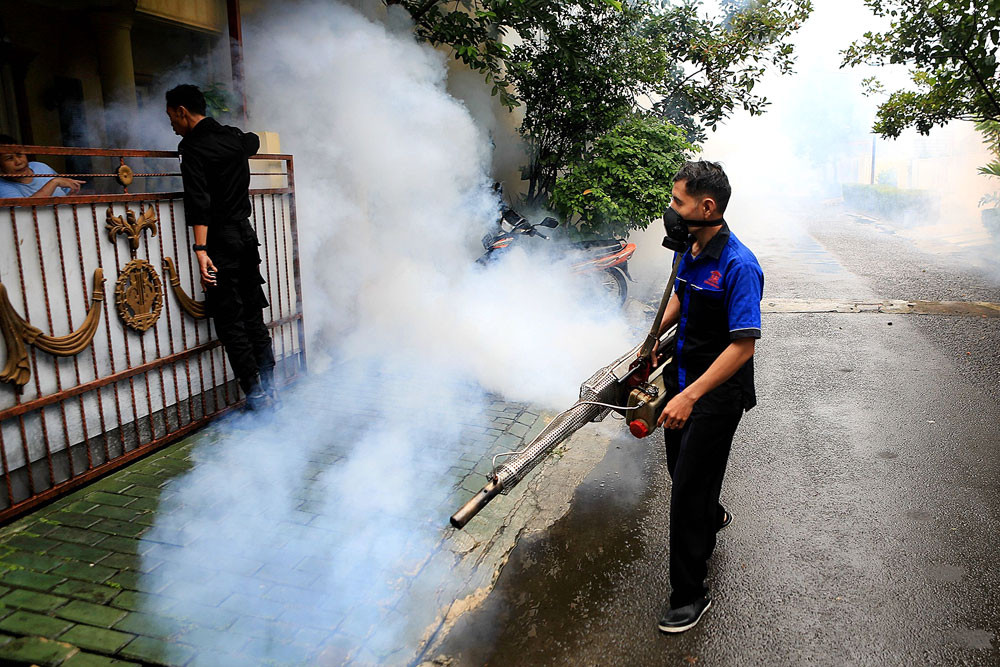Dengue kills more than 100 people in Indonesia
Change Size
 A worker sprays insecticide with a fogging machine to eradicate mosquitoes in a residential area in Bintaro, South Tangerang, on Jan. 24. As the rainy season continues, efforts to prevent dengue outbreaks caused by the Aedes aegypti mosquitoes have been intensified.
(The Jakarta Post/Seto Wardhana )
A worker sprays insecticide with a fogging machine to eradicate mosquitoes in a residential area in Bintaro, South Tangerang, on Jan. 24. As the rainy season continues, efforts to prevent dengue outbreaks caused by the Aedes aegypti mosquitoes have been intensified.
(The Jakarta Post/Seto Wardhana )
M
ore than 100 people have died of dengue fever this month, with the largest number of fatalities, 41, recorded in East Java, 13 in North Sulawesi and 12 in East Nusa Tenggara (NTT), the Health Ministry has said.
Dengue had also killed people in 16 other provinces by Saturday, Central Java recorded nine fatalities, one in West Java and seven in South Sulawesi, the ministry’s director for vector-borne and zoonotic diseases Siti Nadia Tarmizi said.
The ministry has recorded at least 9,634 dengue cases in 372 cities and regencies across the archipelago during this year's rainy season when dengue-bearing mosquitoes are most active. By Saturday, four regions, Kupang city and West Manggarai regency in NTT, Kapuas regency in Central Kalimantan and North Sulawesi province had declared a dengue emergency according to Siti.
“Several provinces have also seen a significant increase in dengue cases: East Java, Central Java, West Java, Jakarta, Lampung, South Sulawesi and East Kalimantan, as well as NTT and North Sulawesi,” Siti told The Jakarta Post on Saturday.
“Rainy seasons like this make it easier for the mosquito to breed. One female mosquito can lay hundreds of eggs and these eggs can turn into adult mosquito in just two days. So please be more vigilant during the rainy season,” she said. “There is a possibility the cases will peak in February and March, depending on how regions prevent the spread of the disease.”
In East Java, dengue cases so far in January have increased to 1,634 compared with 1,114 in January 2018.
“The increase is around 47 percent,” East Java Health Agency head Hari Santoso said. “We try to get the number down by eliminating the mosquito nests and raising public participation in the efforts to prevent dengue fever infection during the rainy season.”
West Java, meanwhile, recorded at least 1,085 cases as of Jan. 22.
“But that number only represents 21 regencies and cities; not all of the total 27 regencies and cities have submitted their reports,” West Java Health Agency's head of infectious disease prevention and control unit Widyawati said.
State-run Hasan Sadikin hospital in the West Java provincial capital of Bandung has also recorded more dengue cases this month.
“Usually in a month we treat eight to 10 dengue patients, but this month, at least as of Jan. 24, we have already treated 55 patients. It’s a huge surge,” hospital director Nina Susana said, adding that the hospital might consider allocating hallways or other hospital wards for dengue patients should the number increase further.
Kupang declared an emergency on Jan. 23 across the capital of NTT following what Kupang Health Agency head I Wayan Ari Wijana described as “a large increase in dengue fever cases in three consecutive weeks since early January”.
The number grew from 21 cases in the first week of January to 82 cases in the second week and to 127 cases in the third week.
The dengue emergency is aimed at ramping up vector control, including through fogging, the use of larvicide and the “3M” burying-draining-covering method to eliminate standing water open to mosquito breeding.
“Every subdistrict must conduct fogging as soon as possible. Do not wait until someone dies to carry out the measure,” Kupang Mayor Jefirstson Riwu Kore told his staff recently.
In mid-January, West Manggarai regency declared a dengue emergency, saying it would prepare almost Rp 2 billion (US$142,191) to handle the outbreak, including by fogging and larvicide use in four areas where most cases were found.
At least 263 cases have been reported across the regency so far this year.
Dominikus Hawan of West Manggarai dengue emergency task force said authorities had conducted fogging in the Terang area. “As for the three other areas [Wae Nakeng, Rekas and Werang], we are so far focusing on distributing larvicide powder there awaiting the arrival of fogging equipment.”
Dengue fever cases were also recorded in neighboring Manggarai and East Manggarai regencies.
In 2017, the nation saw 68,407 dengue cases with 493 fatalities, this was down from 204,171 cases with 1,598 fatalities in 2016. (ipa)
-- Aman Rochman, Arya Dipa and Novi Abdi contributed to the story from Malang, Bandung and Balikpapan.









